
Haiti, officially the Republic of Haiti, is a country on the island of Hispaniola in the Caribbean Sea, east of Cuba and Jamaica, and south of The Bahamas. It occupies the western three-eighths of the island, which it shares with the Dominican Republic. Haiti is the third largest country in the Caribbean, and with an estimated population of 11.4 million, is the most populous Caribbean country. The capital and largest city is Port-au-Prince.
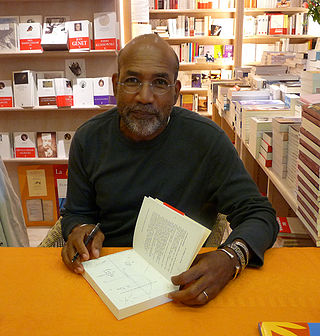
Patrick Chamoiseau is a French author from Martinique known for his work in the créolité movement. His work spans a variety of forms and genres, including novels, essays, children's books, screenplays, theatre and comics. His novel Texaco was awarded the Prix Goncourt in 1992.

Fanmi Lavalas is a social-democratic political party in Haiti. Its leader is former Haitian President Jean-Bertrand Aristide. It has been a powerful force in Haitian politics since 1991. Fanmi Lavalas governments advocate a policy of "growth with equity" based on Western European social democratic principles. Fanmi Lavalas governments have emphasised investment in education and health care as their priorities and have refused International Monetary Fund austerity measures.
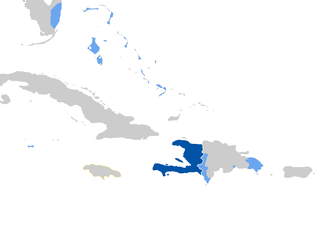
Haitian Creole, or simply Creole, is a French-based creole language spoken by 10 to 12 million people worldwide, and is one of the two official languages of Haiti, where it is the native language of the vast majority of the population. Northern, Central, and Southern dialects are the three main dialects of Haitian Creole. The Northern dialect is predominantly spoken in Cap-Haïtien, Central is spoken in Port-au-Prince, and Southern in the Cayes area.

The president of Haiti, officially called the president of the Republic of Haiti, is the head of state of Haiti. Executive power in Haiti is divided between the president and the government, which is headed by the prime minister of Haiti.[A133] The Transitional Presidential Council has been exercising the powers of the presidency since 25 April 2024. It has a mandate to act that concludes on 7 February 2026.
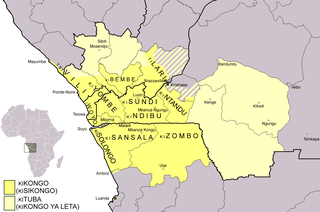
Kongo or Kikongo is one of the Bantu languages spoken by the Kongo people living in the Democratic Republic of the Congo (DRC), the Republic of the Congo, Gabon, and Angola. It is a tonal language. The vast majority of present-day speakers live in Africa. There are roughly seven million native speakers of Kongo in the above-named countries. An estimated five million more speakers use it as a second language.
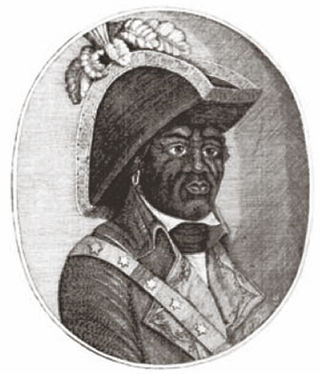
George Biassou was an early leader of the 1791 slave rising in Saint-Domingue that began the Haitian Revolution. With Jean-François and Jeannot, he was prophesied by the vodou priest Dutty Boukman to lead the revolution.
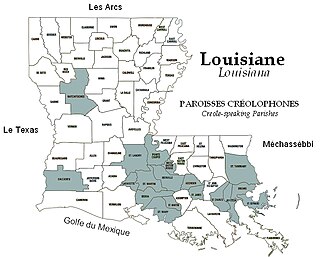
Louisiana Creole is a French-based creole language spoken by fewer than 10,000 people, mostly in the U.S. state of Louisiana. Also known as Kouri-Vini, it is spoken today by people who may racially identify as white, black, mixed, and Native American, as well as Cajun and Creole. It should not be confused with its sister language, Louisiana French, a dialect of the French language. Many Louisiana Creoles do not speak the Louisiana Creole language and may instead use French or English as their everyday languages.
Afro-Caribbean or African Caribbeanpeople are Caribbean people who trace their full or partial ancestry to Africa. The majority of the modern Afro-Caribbean people descend from the Africans taken as slaves to colonial Caribbean via the trans-Atlantic slave trade between the 15th and 19th centuries to work primarily on various sugar plantations and in domestic households. Other names for the ethnic group include Black Caribbean, Afro- or Black West Indian, or Afro- or Black Antillean. The term West Indian Creole has also been used to refer to Afro-Caribbean people, as well as other ethnic and racial groups in the region, though there remains debate about its use to refer to Afro-Caribbean people specifically. The term Afro-Caribbean was not coined by Caribbean people themselves but was first used by European Americans in the late 1960s.

Richard Barry Freeman is an economist. The Herbert Ascherman Professor of Economics at Harvard University and Co-Director of the Labor and Worklife Program at Harvard Law School, Freeman is also Senior Research Fellow on Labour Markets at the Centre for Economic Performance, part of the London School of Economics, funded by the Economic and Social Research Council, the UK's public body funding social science. Freeman directs the Science and Engineering Workforce Project (SEWP) at the National Bureau of Economic Research (NBER), a network focused on the economics of science, technical, engineering, and IT labor which has received major long-term support from the Sloan Foundation.

Haitian Americans are a group of Americans of full or partial Haitian origin or descent. The largest proportion of Haitians in the United States live in Little Haiti to the South Florida area. In addition, they have settled in major Northeast cities such as New York City, Boston, Philadelphia, Baltimore and Washington, D.C., and in Chicago and Detroit in the Midwest. Most are immigrants or their descendants from the mid-late 20th-century migrations to the United States. Haitian Americans represent the largest group within the Haitian diaspora.

Louisiana Creoles are a Louisiana French ethnic group descended from the inhabitants of colonial Louisiana before it became a part of the United States during the period of both French and Spanish rule. They share cultural ties such as the traditional use of the French, Spanish, and Creole languages and predominant practice of Catholicism.

The National Assembly consists of the bicameral legislature of the Republic of Haiti, consisting of the upper house as the Senate and the lower house as the Chamber of Deputies .[A88] Both assemblies conduct legislative sessions at the Haitian capital of Port-au-Prince.[A103]

Arnold Antonin is a Haitian film director. A man of diverse careers, Arnold Antonin is known both inside and outside Haiti for his social, political and cultural commitment. He was honored for lifetime achievement with the Djibril Diop Mambety award at the International Film Cannes Festival in 2002. He received the Paul Robeson African Diaspora best film award at FESPACO in Ouagadougou in 2007, 2009, and 2011. He also received numerous awards and accolades at festivals for his documentaries and fiction movies. He was president of the Haitian Filmmakers Association (AHC) from 2005 to 2009.
Haitian literature has been closely intertwined with the political life of Haiti. Haitian intellectuals turned successively or simultaneously to African traditions, France, Latin America, the UK, and the United States. At the same time, Haitian history has always been a rich source of inspiration for literature, with its heroes, its upheavals, its cruelties and its rites.
Bernard MacGregor Walker Knox was an English classicist, author, and critic who became an American citizen. He was the first director of the Center for Hellenic Studies. In 1992 the National Endowment for the Humanities selected Knox for the Jefferson Lecture, the U.S. federal government's highest honor for achievement in the humanities.

Michel Anne Frederic DeGraff is a Haitian creolist and a professor at the Massachusetts Institute of Technology (MIT). His scholarship focuses on Creole studies and the role of language and linguistics for decolonization and liberation. He has advocated for the recognition of Haitian Creole as a full-fledged language.

Michael B. Bracken is an American perinatal epidemiologist. He is the Susan Dwight Bliss Professor of Epidemiology at the Yale School of Public Health, and Professor of Obstetrics, Gynecology and Reproductive Sciences, and Professor of Neurology at the Yale School of Medicine. He is co-director of the Yale Center for Perinatal, Pediatric and Environmental Epidemiology.
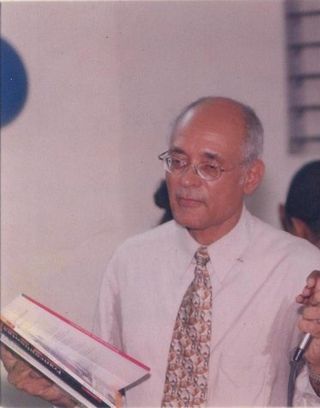
Pierre Vernet was a Haitian linguist and lexicographer, who created the Center for Applied Linguistics in Port-au-Prince. He was instrumental in standardizing Haitian Creole (Krèyol) spelling as an aid to literacy, and the elaboration of French-Krèyol lexicons of terminology. He also published dictionaries with Alain Bentolila and with Bryant Freeman.
Raymond Cassagnol was a Haitian Air Force officer/flight instructor, alleged Haitian rebel leader, and one of the first Haitian Tuskegee Airmen, "Red Tails," or “Schwartze Vogelmenschen” or among enemy German pilots. Cassagnol was an aviation classmate and roommate of Daniel James Jr., the first-ever African American four-star general.















